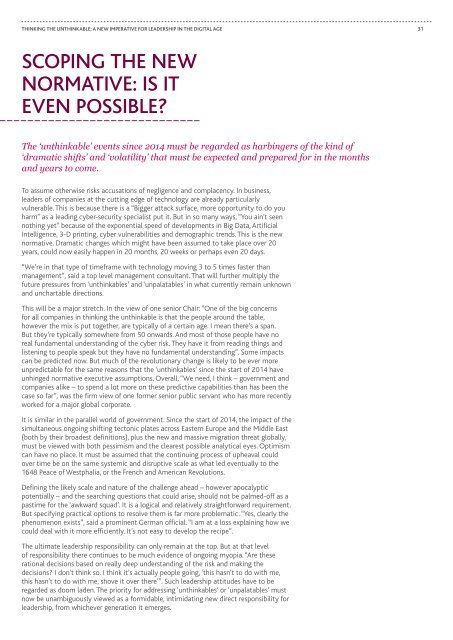Thinking the Unthinkable
Thinking-the-Unthinkable-cima-report
Thinking-the-Unthinkable-cima-report
You also want an ePaper? Increase the reach of your titles
YUMPU automatically turns print PDFs into web optimized ePapers that Google loves.
THINKING THE UNTHINKABLE; A NEW IMPERATIVE FOR LEADERSHIP IN THE DIGITAL AGE<br />
31<br />
SCOPING THE NEW<br />
NORMATIVE: IS IT<br />
EVEN POSSIBLE?<br />
The ‘unthinkable’ events since 2014 must be regarded as harbingers of <strong>the</strong> kind of<br />
‘dramatic shifts’ and ‘volatility’ that must be expected and prepared for in <strong>the</strong> months<br />
and years to come.<br />
To assume o<strong>the</strong>rwise risks accusations of negligence and complacency. In business,<br />
leaders of companies at <strong>the</strong> cutting edge of technology are already particularly<br />
vulnerable. This is because <strong>the</strong>re is a “Bigger attack surface, more opportunity to do you<br />
harm” as a leading cyber-security specialist put it. But in so many ways, “You ain’t seen<br />
nothing yet” because of <strong>the</strong> exponential speed of developments in Big Data, Artificial<br />
Intelligence, 3-D printing, cyber vulnerabilities and demographic trends. This is <strong>the</strong> new<br />
normative. Dramatic changes which might have been assumed to take place over 20<br />
years, could now easily happen in 20 months, 20 weeks or perhaps even 20 days.<br />
“We’re in that type of timeframe with technology moving 3 to 5 times faster than<br />
management”, said a top level management consultant. That will fur<strong>the</strong>r multiply <strong>the</strong><br />
future pressures from ‘unthinkables’ and ‘unpalatables’ in what currently remain unknown<br />
and unchartable directions.<br />
This will be a major stretch. In <strong>the</strong> view of one senior Chair: “One of <strong>the</strong> big concerns<br />
for all companies in thinking <strong>the</strong> unthinkable is that <strong>the</strong> people around <strong>the</strong> table,<br />
however <strong>the</strong> mix is put toge<strong>the</strong>r, are typically of a certain age. I mean <strong>the</strong>re’s a span.<br />
But <strong>the</strong>y’re typically somewhere from 50 onwards. And most of those people have no<br />
real fundamental understanding of <strong>the</strong> cyber risk. They have it from reading things and<br />
listening to people speak but <strong>the</strong>y have no fundamental understanding”. Some impacts<br />
can be predicted now. But much of <strong>the</strong> revolutionary change is likely to be ever more<br />
unpredictable for <strong>the</strong> same reasons that <strong>the</strong> ‘unthinkables’ since <strong>the</strong> start of 2014 have<br />
unhinged normative executive assumptions. Overall, “We need, I think – government and<br />
companies alike – to spend a lot more on <strong>the</strong>se predictive capabilities than has been <strong>the</strong><br />
case so far”, was <strong>the</strong> firm view of one former senior public servant who has more recently<br />
worked for a major global corporate.<br />
It is similar in <strong>the</strong> parallel world of government. Since <strong>the</strong> start of 2014, <strong>the</strong> impact of <strong>the</strong><br />
simultaneous ongoing shifting tectonic plates across Eastern Europe and <strong>the</strong> Middle East<br />
(both by <strong>the</strong>ir broadest definitions), plus <strong>the</strong> new and massive migration threat globally,<br />
must be viewed with both pessimism and <strong>the</strong> clearest possible analytical eyes. Optimism<br />
can have no place. It must be assumed that <strong>the</strong> continuing process of upheaval could<br />
over time be on <strong>the</strong> same systemic and disruptive scale as what led eventually to <strong>the</strong><br />
1648 Peace of Westphalia, or <strong>the</strong> French and American Revolutions.<br />
Defining <strong>the</strong> likely scale and nature of <strong>the</strong> challenge ahead – however apocalyptic<br />
potentially – and <strong>the</strong> searching questions that could arise, should not be palmed-off as a<br />
pastime for <strong>the</strong> ‘awkward squad’. It is a logical and relatively straightforward requirement.<br />
But specifying practical options to resolve <strong>the</strong>m is far more problematic. “Yes, clearly <strong>the</strong><br />
phenomenon exists”, said a prominent German official. “I am at a loss explaining how we<br />
could deal with it more efficiently. It’s not easy to develop <strong>the</strong> recipe”.<br />
The ultimate leadership responsibility can only remain at <strong>the</strong> top. But at that level<br />
of responsibility <strong>the</strong>re continues to be much evidence of ongoing myopia. “Are <strong>the</strong>se<br />
rational decisions based on really deep understanding of <strong>the</strong> risk and making <strong>the</strong><br />
decisions? I don’t think so. I think it’s actually people going, ‘this hasn’t to do with me,<br />
this hasn’t to do with me, shove it over <strong>the</strong>re’”. Such leadership attitudes have to be<br />
regarded as doom laden. The priority for addressing ‘unthinkables’ or ‘unpalatables’ must<br />
now be unambiguously viewed as a formidable, intimidating new direct responsibility for<br />
leadership, from whichever generation it emerges.



